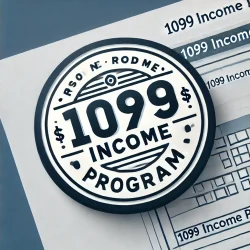
1099 Income Loan Program: Tailored for 1099 Earners, No Tax Returns Required
Our 1099 Income Loan program is designed specifically for self-employed individuals, independent contractors, and gig economy workers who receive 1099 income. Traditional mortgage options often rely on tax returns, which can be limiting for 1099 earners. With this program, you can qualify using alternative documentation that better reflects your financial situation.
1099 Income Loan Program
Key Features:
- Loan amounts ranging from $150,000 up to $3 million
- Available for purchases, cash-out refinances, and rate-term refinances
- Applicable for owner-occupied homes, second homes, and investment properties
- No tax returns required for qualification
- Flexible guidelines, including only two years’ seasoning required for foreclosure, short sale, bankruptcy, or deed-in-lieu
- Qualification using the most recent one or two years of 1099 forms, combined with a year-to-date earning statement
- Income verification through year-to-date earnings from earning statements, paystubs, or bank statements
- 1099s must be issued by a single employer and be in the borrower’s personal name
- Borrower must be self-employed with consistent income from the same employer for at least two years
Min Fico
640
(Up to 75% LTV)
Max LTV
90%
(Minimum 720 FICO)
Who Benefits from This Loan?
This program is ideal for underserved self-employed borrowers such as freelancers, contractors, and gig economy workers. These borrowers often struggle to qualify under conventional loan guidelines due to the nature of their income documentation. Our 1099 Income Loan provides a practical alternative, allowing these borrowers to achieve homeownership without relying on traditional tax return requirements.
1099 Loan Program FAQ's
Can you get a mortgage with 1099 income?
Absolutely. 1099 earners can qualify for a mortgage by using their 1099 earning statements or bank statements. This loan option is especially beneficial for those who have difficulty verifying their income through tax returns. Typically, one to two years of the most recent 1099 statements are needed, along with proof of consistent employment from a single employer for at least two years.
Is 1099 earned income considered self-employed income?
Yes. Income reported on a 1099 form (usually listed in Box 7 on the 1099-MISC) is considered non-employee compensation, also known as self-employment income. If you receive 1099 income, you are classified as a self-employed individual, which opens doors to specialized mortgage solutions like this one.
How is income verified for a self-employed borrower?
Income verification is done through 1099 earning statements, bank statements, paystubs, or a combination of these documents. Year-to-date earnings play a critical role in the verification process. Lenders will also look at the consistency and stability of your income over time.
If you need more detailed guidance or have specific questions, feel free to reach out to one of our mortgage experts. They can walk you through the process and help determine if this program is right for you.
In conclusion, the 1099 Income Loan Program offers a valuable solution for self-employed individuals, freelancers, and independent contractors who may struggle to meet the stringent documentation requirements of traditional mortgage options. By allowing borrowers to qualify using their 1099 earning statements or bank statements instead of tax returns, this program opens the door to homeownership for a growing segment of the workforce. Whether you’re looking to purchase a new home, refinance, or invest in property, this program provides the flexibility needed to align with your unique financial situation. With loan amounts up to $3 million and options available for primary residences, second homes, and investment properties, the 1099 Income Loan is an empowering alternative that addresses the specific needs of non-W2 earners. As the self-employed workforce continues to expand, programs like this are essential for ensuring that all qualified borrowers have access to the home financing they deserve.
